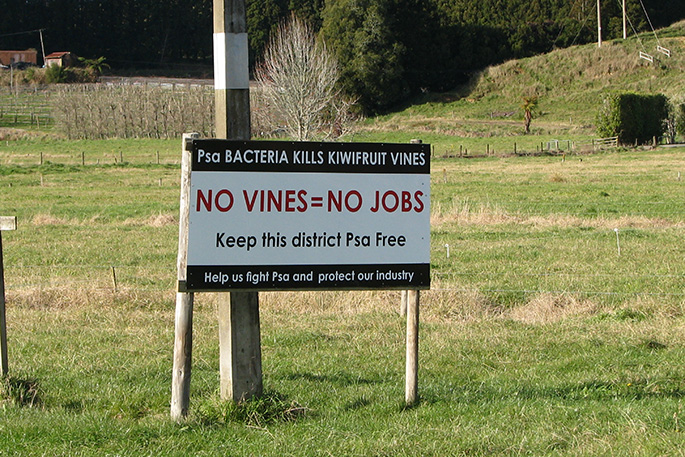Seven years after the Psa outbreak that affected the kiwifruit industry in New Zealand, 212 kiwifruit claimants will finally get their day in the High Court in August.
The Kiwifruit Claim seeks to hold the government and the Ministry of Primary Industries to account for ‘significant losses' suffered by growers as a result of the outbreak.
Kiwifruit Claim chairman John Cameron says growers' lives and livelihoods were ‘ripped apart' by Psa, and for many the impact is ongoing.
'There were growers who were wiped out, and faced with no crops and plummeting values of their orchards, lost their businesses, and were forced to sell at heavily discounted prices. Those that survived often suffered a complete loss of income, taking on huge debts to replant. Many growers are now only just beginning to get back to pre-Psa production levels after seven years,” says John.
'The claimants are adamant that MPI should never have allowed kiwifruit pollen into New Zealand. Put simply, the Psa outbreak in October 2010 would never have happened if MPI had followed its own protocols under the Biosecurity Act.
'By 2004 MPI had identified that Psa was a biosecurity risk to the industry and banned the importation of kiwifruit plant material, except in tightly controlled situations. However, MPI failed to properly consider at the same time whether kiwifruit pollen could carry Psa and did not also prohibit the importation of pollen. Instead, they decided to consider the specific risks that kiwifruit pollen posed if a request for an import permit was received in the future.
'When an application was made to import pollen in 2007, instead of undertaking a risk assessment in accordance with its own procedures, MPI took shortcuts – it made a decision to allow imports of pollen based on a brief informal review and discussions, and without consulting industry.
'By taking shortcuts, MPI failed to identify and consider the fact that commercial pollen is always contaminated with plant material, and failed to identify the risk of Psa being introduced with infected pollen. The Kiwifruit Claimants say MPI was wrong to allow imports of pollen – the risk of transmission of Psa was too high.
'Then in 2008, despite MPI officials receiving notification about the outbreak of a virulent strain of Psa in Italy, MPI never reviewed its assessment, and still failed to take any steps to ban the importation of kiwifruit pollen – it issued a permit to import pollen in 2009 from China.
He says that shipment was in fact 4.5kg of pollen, anthers and other plant material from Shaanxi Province in China.
'MPI's internal procedures require nursery stock to be quarantined and inspected. MPI either failed to realise that the Shaanxi shipment was not pure pollen, or did not inspect it at all.
'The shipment was approved and immediately transported to Te Puke. It was later processed into pollen by a commercial operator, and between 3-4kg of plant material was somehow disposed of. Once Psa was in the country, there was no way it could be contained.”
He says claimants have DNA scientific evidence that the strain of Psa which led to the outbreak in New Zealand matches almost identically Psa from Shaanxi Province.
MPI has denied all of the claims made by the group.



2 comments
Ouch!
Posted on 25-06-2017 20:11 | By morepork
If this is true, then it is reprehensible and the Courts are the right place to pursue it. let's hope lessons have been learned and we are unlikely to see this kind of thing happening again.
PSA
Posted on 26-06-2017 20:18 | By phoenix
Meanwhile orchardists, who were sold up by certain banks running scared,at the bottom of this disaster, are still left way out of money to seek compensation. Best wishes to those who have managed to bring this court action.
Leave a Comment
You must be logged in to make a comment.